情景交际和写作技巧以及特殊句式
情景交际和写作技巧以及特殊句式

情景交际和写作技巧以及特殊句式————————————————————————————————作者:————————————————————————————————日期:英语常见表达汇总1. 建议、邀请及应答(1)建议和邀请:Whynot dosth.?(为什么不?)Let’sdosth.(让咱们做。
)ShallI/we dosth?(我或我们将?)Will /Wouldyou like dosth?(你想要?)How about/Whatabout doing sth?(……怎么样?)(2)接受:Good idea.(好主意。
)That/Itsoundsgreat.(太好了。
)That / It wouldbe very nice.(太好了。
) Withpleasure.(乐意。
) I’d love/like to.(我愿意)I’ll be glad to.(我愿意)Yes, please.(请吧。
) Certainly/Of course/ sure.(当然。
)Noproblem.(没问题。
)I agree.(我同意。
) Ithinkso.(我认为如此。
)(3)拒绝:I’m afraid Ican’t/ I’m afraid not.(恐怕不行。
)I disagree.(我不同意。
)Idon’t think so.(我不这么认为。
) No, thanks.(不,谢谢。
)有时常用委婉、含蓄的答语,如I’d love /like to , but I am busy / I have a lot ofho mework to do.(我愿意,不过很忙或有许多作业要做。
)2.请求许可及应答(1)请求和允许:Will /Would youmind doing sth.? (做某事,你介意吗?)Will /Would youmind not doingsth.? (别做某事,你介意吗?)Would you like to do sth.?(你想要做某事吗?)Would you like sth.? (你想要某物吗?)Can/ Could youplease do sth.?(请你做某事,好吗?)Can /Couldyou please (not)do sth.? (请你别做某事,好吗?)Could I do sth.?/May I do sth.?(我可以做某事吗?)Please do sth. (请做某事。
情景交际常用句型
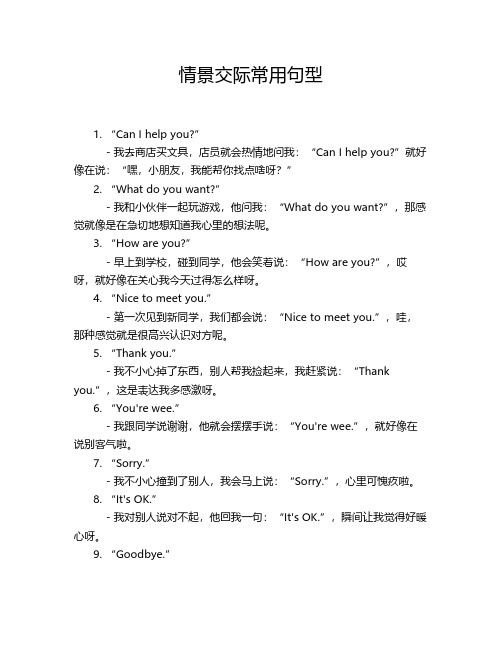
情景交际常用句型
1.“Can I help you?”
-我去商店买文具,店员就会热情地问我:“Can I help you?”就好像在说:“嘿,小朋友,我能帮你找点啥呀?”
2.“What do you want?”
-我和小伙伴一起玩游戏,他问我:“What do you want?”,那感觉就像是在急切地想知道我心里的想法呢。
3.“How are you?”
-早上到学校,碰到同学,他会笑着说:“How are you?”,哎呀,就好像在关心我今天过得怎么样呀。
4.“Nice to meet you.”
-第一次见到新同学,我们都会说:“Nice to meet you.”,哇,那种感觉就是很高兴认识对方呢。
5.“Thank you.”
-我不小心掉了东西,别人帮我捡起来,我赶紧说:“Thank you.”,这是表达我多感激呀。
6.“You're wee.”
-我跟同学说谢谢,他就会摆摆手说:“You're wee.”,就好像在说别客气啦。
7.“Sorry.”
-我不小心撞到了别人,我会马上说:“Sorry.”,心里可愧疚啦。
8.“It's OK.”
-我对别人说对不起,他回我一句:“It's OK.”,瞬间让我觉得好暖心呀。
9.“Goodbye.”
-放学了,和同学们分别时,我们都会说:“Goodbye.”,就像是在说下次再见啦。
10.“See you later.”
-去朋友家玩完要回家了,我会说:“See you later.”,感觉就是期待着下一次见面呢。
情景交际的技巧
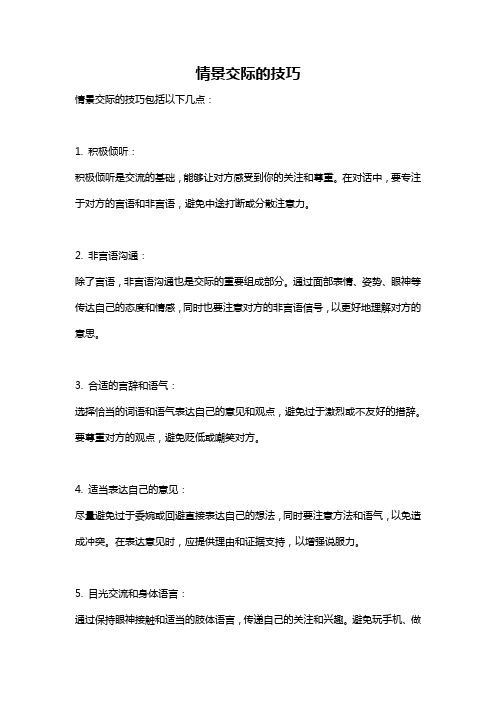
情景交际的技巧情景交际的技巧包括以下几点:1. 积极倾听:积极倾听是交流的基础,能够让对方感受到你的关注和尊重。
在对话中,要专注于对方的言语和非言语,避免中途打断或分散注意力。
2. 非言语沟通:除了言语,非言语沟通也是交际的重要组成部分。
通过面部表情、姿势、眼神等传达自己的态度和情感,同时也要注意对方的非言语信号,以更好地理解对方的意思。
3. 合适的言辞和语气:选择恰当的词语和语气表达自己的意见和观点,避免过于激烈或不友好的措辞。
要尊重对方的观点,避免贬低或嘲笑对方。
4. 适当表达自己的意见:尽量避免过于委婉或回避直接表达自己的想法,同时要注意方法和语气,以免造成冲突。
在表达意见时,应提供理由和证据支持,以增强说服力。
5. 目光交流和身体语言:通过保持眼神接触和适当的肢体语言,传递自己的关注和兴趣。
避免玩手机、做其他事情或背对对方,以显示尊重和专注度。
6. 问问题和提供反馈:通过提问和反馈来促进对话和理解。
问问题可以帮助你更深入地了解对方的意图和需求,提供反馈可以确认你理解了对方的意思并展示你的关注。
7. 理解和接受对方:尽量理解对方的观点、感受和需求,并尊重对方的独特性。
避免直接否定或抨击对方的意见,要学会尊重不同的观点和多样性。
8. 适当的沉默和打破沉默:沉默可以让对方有时间思考和表达意见,但过长的沉默可能会让对话变得尴尬。
要学会适时打破沉默,提供自己的观点或反馈,以维持对话的流畅性。
9. 控制情绪:在交流过程中,要学会控制自己的情绪,避免过于激动、愤怒或沮丧。
保持冷静和理智,以便更好地解决问题和维持良好的交流氛围。
10. 维护良好关系:情景交际不仅仅是为了传达信息,更重要的是建立和维护良好的人际关系。
友善、尊重、关心和合作是维持良好关系的基础。
六年级情景交际知识点归纳

六年级情景交际知识点归纳随着社会的发展,交际能力在我们的生活中变得越来越重要。
六年级是一个重要的转折点,学生们需要掌握一定的情景交际知识,以便在不同的场合中与他人进行有效的沟通。
本文将归纳六年级情景交际知识点,帮助同学们更好地掌握交际技巧。
1. 问候与自我介绍在社交场合中,问候和自我介绍是最基本的交际方式之一。
我们应该学会如何用简洁而礼貌的语言与他人打招呼,比如:- 早上好!- 晚上好!- 你好!- 很高兴认识你。
同时,当我们与陌生人交流时,自我介绍是必不可少的,包括姓名、年龄、学校等关键信息。
2. 请求帮助与提供帮助在学习或生活中,我们难免会遇到问题,这时就需要学会请求帮助。
礼貌地提出请求可以更好地得到他人的帮助,比如:- 对不起,我不明白这个问题,你能帮助我吗?- 不好意思,我把书忘在教室里了,你能帮我拿一下吗?同样地,如果有人向我们请求帮助,我们也应该乐于助人,主动提供帮助,比如:- 当然可以,我很乐意帮助你。
- 没问题,我可以帮你找一下。
3. 表达意见和建议在团队合作或群体讨论中,我们需要学会自信地表达自己的意见和建议。
以下是一些常用的表达方式:- 我认为...- 我建议...- 我觉得...同时,我们也要尊重他人的意见,可以使用以下短语进行回应:- 这是个好主意。
- 我同意你的观点。
- 谢谢你的建议,我会考虑一下。
4. 邀请与应答在生活中,我们常常需要邀请他人参加某个活动或者应答他人的邀请。
以下是一些常用的表达方式:- 你愿意和我一起去看电影吗?- 请你来参加我的生日聚会。
对于邀请,我们需要学会礼貌地回答,可以使用以下句式:- 非常抱歉,我有其他安排,不能参加。
- 当然可以,我很高兴参加。
5. 道歉与接受道歉在生活中,我们有时会犯错误或者给他人带来困扰,这时就需要学会道歉。
以下是一些常用的道歉方式:- 对不起,我不小心打翻了你的水杯。
- 很抱歉迟到了。
当我们收到别人的道歉时,也要学会接受道歉,可以使用以下表达:- 没关系,我没事。
英语情景口语对话技巧

英语情景口语对话技巧
在英语情景口语对话中,掌握一些技巧是非常重要的。
以下是一些建议和技巧,可以帮助你更自信地与他人交流:
1. 练习发音:清晰准确的发音是英语口语流利的关键。
你需要掌握每个单词的正确发音,并练习发声技巧,如语调、重音和连读等。
2. 听力理解:提高听力理解能力可以帮助你更好地理解对方所说的话,并做出适当的回应。
多听英语音频、视频和与外国人交流可以帮助你提高听力理解能力。
3. 词汇积累:扩大词汇量可以帮助你更准确地表达自己的意思。
通过阅读、听力练习和与他人交流来增加词汇量。
4. 语法掌握:掌握基本的语法规则可以帮助你更准确地表达自己的意思。
了解句子结构、时态和语态等基本语法规则是非常重要的。
5. 日常用语:学习常用的日常用语可以帮助你更好地与他人交流。
了解常见的问候、道别、感谢和道歉等表达方式。
6. 文化了解:了解英语国家的文化背景可以帮助你更好地理解对方的言行举止,避免误解和尴尬。
了解英语国家的礼仪、习俗和价值观等。
7. 保持自信:保持自信的态度可以帮助你更好地表达自己。
不要害怕犯错,多与他人交流,积极寻求反馈和建议。
8. 持续练习:只有通过持续不断的练习才能提高英语口语能力。
尽可能多地与外国人交流,参加英语角、口语班等活动,或者找一个语伴一起练习。
总之,提高英语口语能力需要不断地练习和学习。
掌握以上技巧可以帮助你更自信地与他人交流,提高你的英语口语水平。
英语情景交际题答题技巧
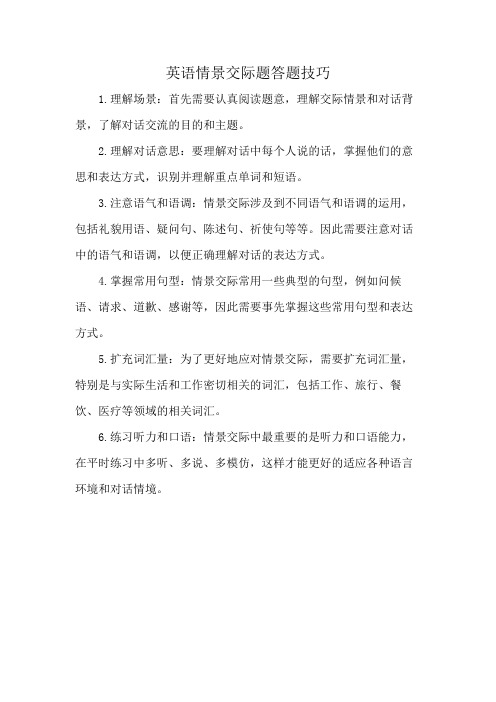
英语情景交际题答题技巧
1.理解场景:首先需要认真阅读题意,理解交际情景和对话背景,了解对话交流的目的和主题。
2.理解对话意思:要理解对话中每个人说的话,掌握他们的意思和表达方式,识别并理解重点单词和短语。
3.注意语气和语调:情景交际涉及到不同语气和语调的运用,包括礼貌用语、疑问句、陈述句、祈使句等等。
因此需要注意对话中的语气和语调,以便正确理解对话的表达方式。
4.掌握常用句型:情景交际常用一些典型的句型,例如问候语、请求、道歉、感谢等,因此需要事先掌握这些常用句型和表达方式。
5.扩充词汇量:为了更好地应对情景交际,需要扩充词汇量,特别是与实际生活和工作密切相关的词汇,包括工作、旅行、餐饮、医疗等领域的相关词汇。
6.练习听力和口语:情景交际中最重要的是听力和口语能力,在平时练习中多听、多说、多模仿,这样才能更好的适应各种语言环境和对话情境。
广东小高考英语的情景交际
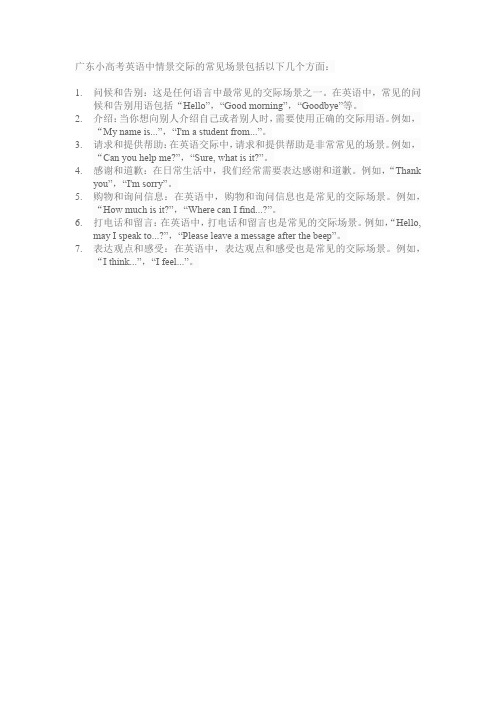
广东小高考英语中情景交际的常见场景包括以下几个方面:
1.问候和告别:这是任何语言中最常见的交际场景之一。
在英语中,常见的问
候和告别用语包括“Hello”,“Good morning”,“Goodbye”等。
2.介绍:当你想向别人介绍自己或者别人时,需要使用正确的交际用语。
例如,
“My name is...”,“I'm a student from...”。
3.请求和提供帮助:在英语交际中,请求和提供帮助是非常常见的场景。
例如,
“Can you help me?”,“Sure, what is it?”。
4.感谢和道歉:在日常生活中,我们经常需要表达感谢和道歉。
例如,“Thank
you”,“I'm sorry”。
5.购物和询问信息:在英语中,购物和询问信息也是常见的交际场景。
例如,
“How much is it?”,“Where can I find...?”。
6.打电话和留言:在英语中,打电话和留言也是常见的交际场景。
例如,“Hello,
may I speak to...?”,“Please leave a message after the beep”。
7.表达观点和感受:在英语中,表达观点和感受也是常见的交际场景。
例如,
“I think...”,“I feel...”。
情景交际题 答题技巧
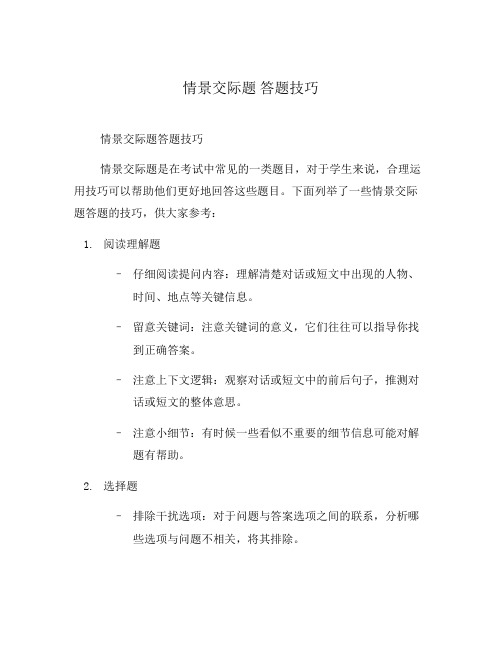
情景交际题答题技巧情景交际题答题技巧情景交际题是在考试中常见的一类题目,对于学生来说,合理运用技巧可以帮助他们更好地回答这些题目。
下面列举了一些情景交际题答题的技巧,供大家参考:1.阅读理解题–仔细阅读提问内容:理解清楚对话或短文中出现的人物、时间、地点等关键信息。
–留意关键词:注意关键词的意义,它们往往可以指导你找到正确答案。
–注意上下文逻辑:观察对话或短文中的前后句子,推测对话或短文的整体意思。
–注意小细节:有时候一些看似不重要的细节信息可能对解题有帮助。
2.选择题–排除干扰选项:对于问题与答案选项之间的联系,分析哪些选项与问题不相关,将其排除。
–观察语意:仔细研究提问的形式,留意选项中的关键词与问题的关键词相关程度。
–使用排除法:通过排除掉明显错误的选项,再从剩下的选项中选择最合适的答案。
3.对话填空题–留意对话的语境:通过观察对话前后句子,理解对话的主题和脉络,帮助填写空缺部分。
–注意固定搭配与习惯用语:有时候对话中会出现固定搭配或习惯用语,掌握这些搭配或用语可以帮助你填写空白处。
–根据上下文语意填写:在理解上下文的基础上,运用你的常识和推断力来填写空缺部分。
4.情景对话连线题–观察人物特征:通过观察人物的特点、职业等,以及对话中透露的信息,将人物与对应的情景连线。
–注意对话顺序:仔细阅读对话,分清对话的先后顺序,帮助你正确连线。
–留意语气词与句型:人物之间的对话往往涉及到语气词和特定句型,观察这些提示可以帮助你正确连线。
5.情景交际题–注意礼貌用语:情景交际中非常重要的是使用得体的礼貌用语,注意礼貌用语的搭配和用法。
–了解文化差异:不同的国家和地区可能有不同的文化习惯和礼仪,学会适应不同的情景并恰当地回答问题。
–合理运用所学知识:利用你所学过的语言知识,用适当的表达方式回答问题。
以上是情景交际题答题的一些常用技巧,希望能对大家在应对这类题目时有所帮助。
通过不断练习和积累经验,相信大家能够在情景交际题中取得更好的成绩。
高考英语情景作文写作技巧与高级句型

高考英语情景作文写作技巧与高级句型情景作文作为高考英语的重要组成部分,不仅测试考生的词汇、句法、语法、语用等语言能力,还检测考生的思维能力,包括语篇组织能力、分析和解决问题能力等。
因此,考生写情景作文,要点表达要有精度,故事叙述要有厚度,抒发情感要有浓度,结尾升华要有深度。
通过有效把握这“四度”,方能使全文浑然一体,饱满充实。
下面以2019年北京高考情景作文“劳动最光荣”为例,探讨如何有效把握“四度”,给读者留下深刻印象。
【试题】假设你是红星中学高三学生李华。
你们班上周组织了一次以“劳动最光荣”为主题的社会实践活动。
请根据以下四幅图的先后顺序,写一篇英文周记,记述整个过程。
注意:词数不少于60。
提示词:西瓜watermelon【分析】上述四幅图所呈现的要点分别为:宣传动员(图一)、准备行李(图二)、体验劳动(图三)、回家分享(图四),活动的主题是“劳动最光荣”。
其中,第三幅图是关于“劳动”的场景,与主题密切相关,要详写。
影响高考英语写作水平的因素主要有两点:语言能力和思维能力。
下面先关注写作中的语言能力。
一、要点表达要有精度先研究下述范文中语言的精度。
Last week I took part in a farm workprogram in the suburbs.At the class meeting, our teacher toldus about the program with the theme“Working is most beautiful”. And hestressed the importance of working with ourown hands.When I got home, I packed up myluggage for the trip.On the farm, we helped pick watermelons. While working, I realised how hardit was to work in the fields under a hot sun.When I came back home, I shared myexperiences with my parents. And theywere very proud of me.在上述范文中,“told us about theprogram”“packed up my luggage”“pickedwatermelons”“shared my experiences withmy parents”分别表达了四幅图的要点,即“宣传动员、准备行李、体验劳动、回家分享”,精准生动。
情景交际题 答题技巧(一)
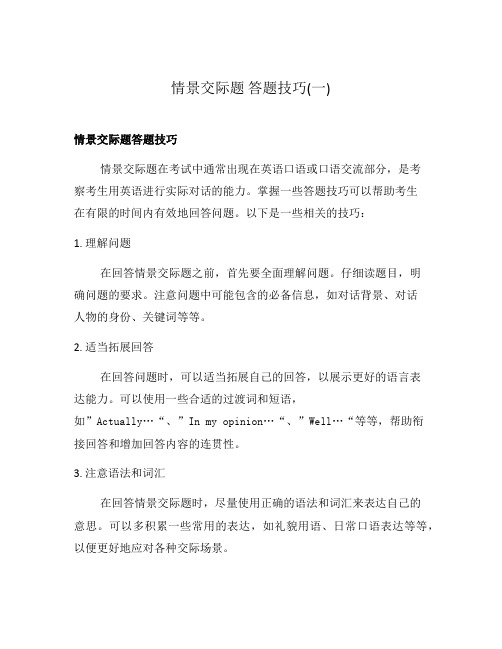
情景交际题答题技巧(一)情景交际题答题技巧情景交际题在考试中通常出现在英语口语或口语交流部分,是考察考生用英语进行实际对话的能力。
掌握一些答题技巧可以帮助考生在有限的时间内有效地回答问题。
以下是一些相关的技巧:1. 理解问题在回答情景交际题之前,首先要全面理解问题。
仔细读题目,明确问题的要求。
注意问题中可能包含的必备信息,如对话背景、对话人物的身份、关键词等等。
2. 适当拓展回答在回答问题时,可以适当拓展自己的回答,以展示更好的语言表达能力。
可以使用一些合适的过渡词和短语,如”Actually…“、”In my opinion…“、”Well…“等等,帮助衔接回答和增加回答内容的连贯性。
3. 注意语法和词汇在回答情景交际题时,尽量使用正确的语法和词汇来表达自己的意思。
可以多积累一些常用的表达,如礼貌用语、日常口语表达等等,以便更好地应对各种交际场景。
4. 灵活运用语言策略在回答问题时,可以适当运用一些语言策略来提高回答的效果。
比如,使用修饰词和副词来增强表达的语气和效果,如”very”、“extremely”、“definitely”等等;使用一些高级词汇和短语来展示自己的词汇量和语言功底。
5. 注意语调和发音在回答情景交际题时,语调和发音也是非常重要的一部分。
尽量遵循英语语音语调的规律,注意句子的重音和停顿的位置,以及正确的发音和语调弯曲。
这样可以更好地使对话流利自然。
6. 多进行练习和模拟对话为了提高在情景交际题中的表达能力,建议多进行练习和模拟对话。
可以与他人进行口语练习,模拟不同情境下的对话,以提高自己的反应速度和表达能力。
7. 自信和积极的态度在回答情景交际题时,保持自信和积极的态度非常重要。
相信自己的英语能力,展示出自己最好的一面。
尽量保持流利自然的口语表达,充分展示自己的英语水平。
以上是关于情景交际题答题的一些技巧和建议。
希望考生能够根据自己的具体情况,灵活运用这些技巧,取得好的成绩。
初中英语情景交际答题技巧
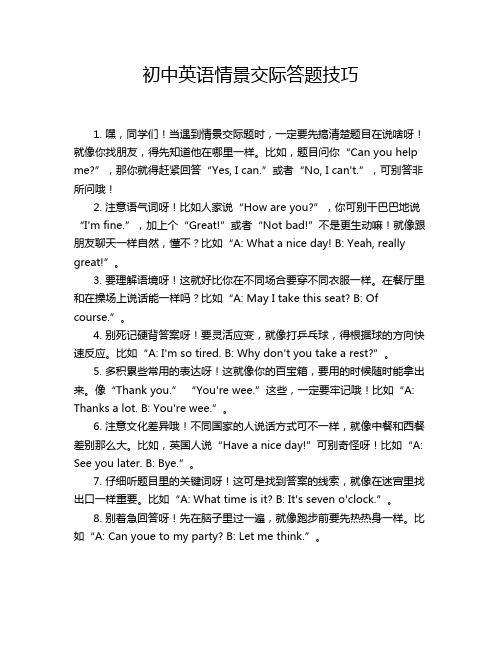
初中英语情景交际答题技巧1. 嘿,同学们!当遇到情景交际题时,一定要先搞清楚题目在说啥呀!就像你找朋友,得先知道他在哪里一样。
比如,题目问你“Can you help me?”,那你就得赶紧回答“Yes, I can.”或者“No, I can't.”,可别答非所问哦!2. 注意语气词呀!比如人家说“How are you?”,你可别干巴巴地说“I'm fine.”,加上个“Great!”或者“Not bad!”不是更生动嘛!就像跟朋友聊天一样自然,懂不?比如“A: What a nice day! B: Yeah, really great!”。
3. 要理解语境呀!这就好比你在不同场合要穿不同衣服一样。
在餐厅里和在操场上说话能一样吗?比如“A: May I take this seat? B: Of course.”。
4. 别死记硬背答案呀!要灵活应变,就像打乒乓球,得根据球的方向快速反应。
比如“A: I'm so tired. B: Why don't you take a rest?”。
5. 多积累些常用的表达呀!这就像你的百宝箱,要用的时候随时能拿出来。
像“Thank you.” “You're wee.”这些,一定要牢记哦!比如“A: Thanks a lot. B: You're wee.”。
6. 注意文化差异哦!不同国家的人说话方式可不一样,就像中餐和西餐差别那么大。
比如,英国人说“Have a nice day!”可别奇怪呀!比如“A: See you later. B: Bye.”。
7. 仔细听题目里的关键词呀!这可是找到答案的线索,就像在迷宫里找出口一样重要。
比如“A: What time is it? B: It's seven o'clock.”。
8. 别着急回答呀!先在脑子里过一遍,就像跑步前要先热热身一样。
情景交际用语详解

在陈述句中,could用于委婉客气地陈述看法和建议,向对方提
供一个选择的内容,可译成“可以”“不妨”。should表示义务 和责任,说话者语气较肯定,常译成“应该”。 在疑问句中,could用于以委婉的语气向别人提出要求、建议或 劝告,此时could不表示过去时,肯定回答用can或sure。should
e.g.
You'd better see a doctor.
你最好去看医生。
常见表达
(6)Would you like…?意为“你想要……吗?”表示有礼貌地 提出请求、邀请或建议。
e.g. Would
you like a cup of coffee?
你想要杯咖啡吗?
2.用could和should提建议
go to the park!我们去公园吧!
(3)Why not…?/Why don't you…?意为“为什么不……?” 用于提供建议,后跟动词原形。
e.g.
Why not sell your CDs?
为什么不把你的CD卖了(来筹钱)?
常见表达
(4)How/What about…?意为“……如何/怎么样?”用来提出
【解析】选E。根据下文用yes作答可知上文应是一般疑问句, 据此可很容易选定答案。故选E。
1
技巧2 依据上下文的语意联系寻找答案。
e.g. 从方框中选择最佳选项补全对话。 A. What’s the matter? B. What should I do then? C. Yes, for about four weeks. D. The weather in this city changes so often.
意见或提供建议。
(1)Shall I/we…?意为“……好吗?我(们)可以……吗?”既 可以用来征求意见也可以用来提供建议,后跟动词原形。
高考英语情景交际解题技巧
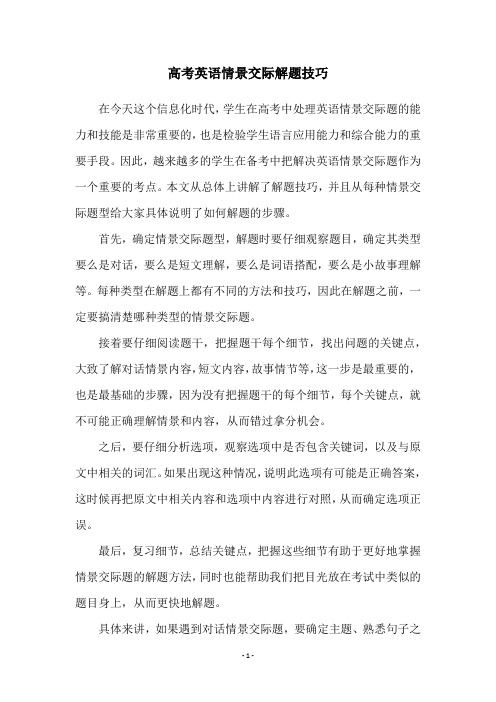
高考英语情景交际解题技巧在今天这个信息化时代,学生在高考中处理英语情景交际题的能力和技能是非常重要的,也是检验学生语言应用能力和综合能力的重要手段。
因此,越来越多的学生在备考中把解决英语情景交际题作为一个重要的考点。
本文从总体上讲解了解题技巧,并且从每种情景交际题型给大家具体说明了如何解题的步骤。
首先,确定情景交际题型,解题时要仔细观察题目,确定其类型要么是对话,要么是短文理解,要么是词语搭配,要么是小故事理解等。
每种类型在解题上都有不同的方法和技巧,因此在解题之前,一定要搞清楚哪种类型的情景交际题。
接着要仔细阅读题干,把握题干每个细节,找出问题的关键点,大致了解对话情景内容,短文内容,故事情节等,这一步是最重要的,也是最基础的步骤,因为没有把握题干的每个细节,每个关键点,就不可能正确理解情景和内容,从而错过拿分机会。
之后,要仔细分析选项,观察选项中是否包含关键词,以及与原文中相关的词汇。
如果出现这种情况,说明此选项有可能是正确答案,这时候再把原文中相关内容和选项中内容进行对照,从而确定选项正误。
最后,复习细节,总结关键点,把握这些细节有助于更好地掌握情景交际题的解题方法,同时也能帮助我们把目光放在考试中类似的题目身上,从而更快地解题。
具体来讲,如果遇到对话情景交际题,要确定主题、熟悉句子之间的关系、仔细分析选项中的关键点,最后从题干和选项中筛选出正确答案;如果是短文理解题,则要学会把握短文的中心思想、仔细看清短文中各段的关系,并且分析材料中重要的词汇,总结出文章的主旨;如果是词语搭配题,则要熟练掌握词义,细致地观察每个词,熟悉语境,正确搭配;如果是小故事理解题,要一步一步把握故事情节,抓住关键信息,分析细节,总结出故事的主旨。
综上所述,解高考英语情景交际题是一项技巧性很强的活动,它要求考生仔细分析语句,把握关键点,并且根据文章中提供的信息来挑选正确答案。
因此,学生要注意充实自己的词汇量,学会更好地把握文章的中心思想,观察短文的每个要点,一步一步解决英语情景交际题,以期取得好的高考成绩。
情景说话的技巧

情景说话的技巧
情景说话的技巧包括以下几点:
1.适应对方:根据对方的职业、地位、兴趣爱好等,选择合适的语言风格和词汇,以便更好地沟通和理解。
2.注意非语言表达:除了语言表达,还要关注对方的身体语言、面部表情等。
这些细节可以帮助我们更准确地理解对方的意思,以及更好地传达自己的意思。
3.明确表达:尽量用简洁明了的语言表达自己的意思,避免使用过于复杂的词汇或难懂的术语。
可以使用实例或比喻来帮助对方更好地理解。
4.倾听并回应:在对话过程中,要全神贯注地倾听对方的观点和意见,并给予适当的回应。
积极地参与对话,不要打断或中断对方的发言。
5.避免争论与批评:在与他人对话时,要保持礼貌和尊重,避免使用攻击性的语言或批评对方的观点。
如果出现意见分歧,可以试图寻找共同点,并以合作的态度解决问题。
6.注意时间和环境:在选择时机和场合时要慎重考虑,避免在不合适的时间或地点进行长时间的对话。
也要注意自己的语音音量和语速,确保能够被对方听到和理解。
7.练习并改进:通过多与他人对话,并不断反思和改进自己的表达方式,可以提高情景说话的技巧。
也可以参加演讲或辩论活动等锻炼自己的口语表达能力。
情景作文写作指导
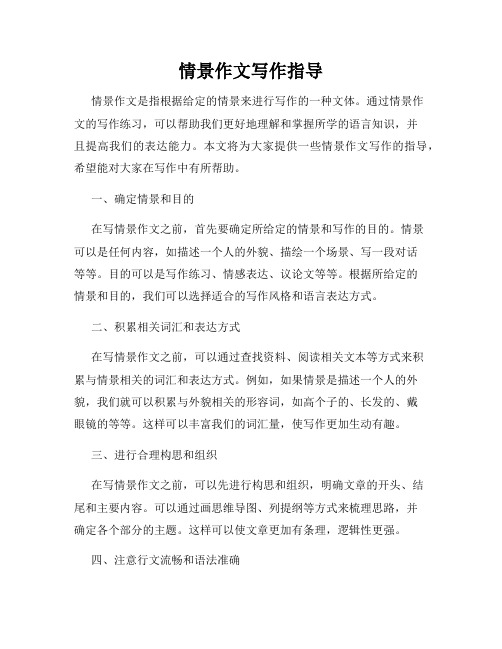
情景作文写作指导情景作文是指根据给定的情景来进行写作的一种文体。
通过情景作文的写作练习,可以帮助我们更好地理解和掌握所学的语言知识,并且提高我们的表达能力。
本文将为大家提供一些情景作文写作的指导,希望能对大家在写作中有所帮助。
一、确定情景和目的在写情景作文之前,首先要确定所给定的情景和写作的目的。
情景可以是任何内容,如描述一个人的外貌、描绘一个场景、写一段对话等等。
目的可以是写作练习、情感表达、议论文等等。
根据所给定的情景和目的,我们可以选择适合的写作风格和语言表达方式。
二、积累相关词汇和表达方式在写情景作文之前,可以通过查找资料、阅读相关文本等方式来积累与情景相关的词汇和表达方式。
例如,如果情景是描述一个人的外貌,我们就可以积累与外貌相关的形容词,如高个子的、长发的、戴眼镜的等等。
这样可以丰富我们的词汇量,使写作更加生动有趣。
三、进行合理构思和组织在写情景作文之前,可以先进行构思和组织,明确文章的开头、结尾和主要内容。
可以通过画思维导图、列提纲等方式来梳理思路,并确定各个部分的主题。
这样可以使文章更加有条理,逻辑性更强。
四、注意行文流畅和语法准确在写情景作文时,要注意行文流畅和语法准确。
可以使用简单明了的句子和短语,避免过长或过于复杂的句子结构。
同时要注意动词时态、代词的使用、主谓一致等语法问题,以确保文章通顺流畅,句子表达准确。
五、运用修辞手法和想象力在情景作文中,可以适当运用一些修辞手法和想象力,使文章更加生动有趣。
例如,可以使用比喻、拟人、夸张等手法,让读者产生强烈的感受和形象的联想。
同时也可以通过丰富的描写来塑造人物形象、描绘场景,增加作文的艺术感染力。
六、进行反复修改和润色在完成情景作文后,要进行反复修改和润色。
可以对文章进行审查,检查语法错误、表达不清晰的地方,并进行适当的改正。
此外,还可以注意提高词汇的选择精确性,调整句式的变化,提升文章的语言水平和文采风格。
通过以上几点的指导,相信大家在写情景作文时会更加得心应手。
情景作文技巧

情景作文写作技巧★书面表达的基本标准:1 结构(分段—三段式总分总开门见山)2要点(情景作文四幅图挖掘其中的核心内容,并把里面的细节挖掘出来,任何一个采分点都不能丢失)3 逻辑(句与句之间,段与段之间少不了能够表达出来逻辑关系的过渡语,如: 转折,递进,对比,并列等)4 语法(如主谓一致,名词单复数,时态语态,句子基本句式结构等)5 亮点高级词汇和高级句型的使用如高级替换should –be supposed to spend…in—devote… to,I came up with a good idea—A good idea occurred to me)高级句型主要体现在三大从句的使用,特殊句式的使用等。
★书面表达的主要问题及应对技巧:一、存在的主要问题(一)语言知识错误指由于对词汇和语法等方面的语言知识掌握不熟练而犯的错误。
概括起来主要有以下几种:1. 遗漏指在语言表达中遗漏了某些必要的成分。
例如:As far as I concerned, English is a tool that widely used in the world. 正确的说法应为:As far as I am concerned, English is a tool that is widely used in the world.2. 添加指语言表达中添加了某些不必要或不正确的成分。
例如:Only in this way can we make a rapid progress in our English. 这句话中的“a”是多余的,应删除。
3. 语法错误指语言表达中出现的语法类错误,比如某些成分的次序安排不当,或者不注意情态动词与动词的搭配等。
例如:Just imagine that if we can speak English smoothly, what our life will be like?句中的“will”应该提至“our”前。
情景作文常用句式(二)

情景作文常用句式(二)情景作文满分高分技巧: 1.情景作文常用句式;2.高级词汇在情景作文中的应用: 动词的使用; 副词和形容词的使用; 连词的使用;。
3.如何选择每幅图的细节点:要基于文章的中心观点; 4.如何将图与图完美的结合在一起,构成连贯的文章: 1)第一幅图如何巧妙总领全篇写作。
2)图与图之间链接常用句型:以时间顺序安排的文章,以独立情形组织的文章。
3)图与图之间连接导致的低分和高分作文的差异; 5.如何在情景作文中完美结尾: 1)使用不同的模板句式; 2)结尾应避免的低分句式。
情景作文常用句式: 1.虚拟语气:but for/except for 要不是Except for/but for John, they would all have spent much time. otherwise 否则I was sick yesterday. Otherwise, I would have gone to the party. Without 没有Without his parents’ support, he could have given up. 2.非谓语动词 3.定语从句 4.状语从句 5.名词性从句 6.倒装句 7.强调句Which 用于非限制性定语从句中还可以指代前面的先行句。
He made much progress in his study, which makes his parents happy. 关系代词as 在定语从句中的用法I want to be the same talented person as he is. He refuses to do such a thing as she does.状语从句的连接词: now that 既然Now that you are sick, you’d better stay in bed. whether…or…无论与否Whether we will succeed or not, we will keep going forward. unless 除非Unless you refuse to try, nobody will stand in your way. in case 以防I put on a sweater in case it gets cold. Not…until…直到……才……Not until 11 at night did he return home. No sooner…than…一……就……No sooner had he finished homework than he practiced singing. Only 只有Only in this way did he get his work done.形容词+as+主语+谓语动词或be 动词 尽管…… Young as the child is, his intelligence is high.So+形容词+助动词+主语+that 如此……以至于…… So excited was he that he couldn’t control himself.It is +被强调部分(只有谓语动词不能被强调)who/that+从句It is the compass that helps us find the right direction to the destination. It is+被强调部分A ,not+被强调部分B+that+从句 正是……而不是…… It is the team, not a single person that leads to the success of the project.高级词汇在情景作文中的应用: 动词1.I left as if I had stumbled into a nightmare country, as you sometimes do in dreams.分析:stumble 意为“步履蹒跚,跌入”,能够更精准的表达fall/walk的意思。
如何在写作中运用情景描写

如何在写作中运用情景描写情景描写是指通过生动、具体的语言描述,将读者带入到作品情境中去,使其能够身临其境地感受到故事的发展和人物的情感。
在写作中运用情景描写可以增强作品的吸引力和可读性,让读者更加投入到故事或主题中。
以下是一些在写作中运用情景描写的方法和技巧:一、使用具体的细节描述在情景描写中,使用具体的细节描述可以让读者更加直观地感受到场景的存在与变化。
例如,描述一个大雨的场景可以使用句子如下:“密集的雨滴宛如钢珠般砸打在路面上,溅起的水花如绵延的琼珠,弥漫着湿润的土壤气息。
”这样的描述会让读者感受到大雨带来的冲击感和湿润的气息。
二、运用形容词和比喻手法形容词和比喻是情景描写的重要工具,通过运用形容词和比喻手法可以使描写更加生动和形象。
例如,描述一个夏日的沙滩可以使用句子如下:“细软的金黄沙粒如细砂漏般从指间滑落,灼热的阳光从天空倾泻而下,犹如滚烫的岩浆。
”这样的描写会让读者感受到夏日沙滩的炙热和炽烈。
三、运用动词和副词的精确描写在情景描写中,使用准确的动词和副词可以使叙事更加生动,抓住读者的注意力。
例如,描写一个激烈的战斗可以使用句子如下:“两军交战之际,刀光剑影,火光冲天,惊天动地的声响伴随着每一次的挥动和撞击。
”这样的描述会让读者感受到战斗的激烈和残酷。
四、运用对话和心理活动的描写在情景描写中,通过对话和人物内心的思考可以更加深入地描述情感和情绪的表达。
例如,描写一个人失恋的场景可以使用句子如下:“她颤抖着唇,泪水滂沱而下,握紧拳头的手微微颤抖着,轻声问道:‘你到底爱过我吗?’他默默地注视着她,艰难地说出了令人心碎的回答。
”这样的描写会让读者感受到失恋者内心无尽的痛苦和心碎。
五、运用环境的描写环境的描写可以通过描绘天气、空间、气味、声音等方面来增强情景效果。
例如,描写一个幽静的山林可以使用句子如下:“阳光透过枝叶的缝隙洒在山野间,微风拂过,带来一阵阵清新的气息,远处的鸟儿不时传来优美的歌唱。
5种常见情景的说话技巧

5种常见情景的说话技巧情景1同事:我今天遇到一个特别不靠谱的司机,带我绕路走不说,我说他两句还说“谁让你自己不认识路”。
气死我了!两种回答1、那你真够倒霉的。
(总结式陈词,加重对方负面感受。
)2、这样的司机真不负责任。
(给予情感上的支持)但你吃一堑长一智,下次上车前先开导航。
(建立希望,预设未来比较好的感受)心理分析对于来自朋友的抱怨,情感支持是第一要务,需要让对方感觉到你的关心和爱护,接下来的建议才有可能被采纳。
因为在大部分人看来,能否不分青红皂白地第一时间表示情感支持是关系强弱的有力证据。
另外,在给建议时可以将时间维度拉伸到未来,这能够帮助朋友缓解当下的负面情绪。
情景2同事:我最近用了一款新的化妆品,感觉还不错噢。
两种回答1、是不是啊?(隐含质疑)我一直在用的那款也很不错。
(岔开话题,以自我为中心)2、我说为什么你最近脸色这么好呢。
(表示认同,提供正面证据强化)是哪一款?我回去也查查,下次试试。
(话题深入,表示兴趣和关切)心理分析总把话题绕到自己身上来的聊天方式并不讨喜。
事实上,每个人都想表达自我,同时又都希望得到他人关注。
如果这种关注很快且被动地被夺走,那么话题发起人无疑会不高兴,从而减弱继续聊天的兴趣。
如果把话题维持在发起人那里,进行积极回应时还能注意补充细节,会让人感觉更加可信和真诚。
情景3同事:不知道和老板在一块的那个人是谁?好像很厉害的样子。
两种回答1、那是Sammy。
(封闭式结论)上个礼拜我们还一起吃饭来着,他说我是他见过的最能干的职员。
(炫耀式陈述)2、噢,那好像是Sam,姓什么我忘记了。
(模糊答案,缩小信息差距)上周在一个公开场合我遇见过他。
(细节补充,但无过分描述)心理分析美国哥伦比亚大学心理学家邓恩通过实验发现,相比较熟悉的伙伴,人们能够从与陌生人的交谈中获得更多的安全感和愉悦感。
因为面对陌生人时,我们的状态相对更轻松,即使是对方有些炫耀,你也不会太受伤。
而在同事之间,聊天更倾向于是种印象管理策略——谁都希望维护自己的好形象。
- 1、下载文档前请自行甄别文档内容的完整性,平台不提供额外的编辑、内容补充、找答案等附加服务。
- 2、"仅部分预览"的文档,不可在线预览部分如存在完整性等问题,可反馈申请退款(可完整预览的文档不适用该条件!)。
- 3、如文档侵犯您的权益,请联系客服反馈,我们会尽快为您处理(人工客服工作时间:9:00-18:30)。
英语常见表达汇总1. 建议、邀请及应答(1)建议和邀请:Why not do sth. (为什么不)Let’s do sth.(让咱们做。
)Shall I / we do sth(我或我们将) Will / Would you like do sth(你想要)How about / What about doing sth(……怎么样)(2)接受:Good idea.(好主意。
) That/ It sounds great.(太好了。
)That / It would be very nice.(太好了。
) With pleasure.(乐意。
)I’d love / like to.(我愿意)I’ll be glad to.(我愿意)Yes, please.(请吧。
) Certainly / Of course / sure.(当然。
)No problem.(没问题。
) I agree.(我同意。
) I think so.(我认为如此。
)(3)拒绝:I’m afraid I can’t / I’m afraid not.(恐怕不行。
) I disagree.(我不同意。
)I don’t think so.(我不这么认为。
) No, thanks.(不,谢谢。
)有时常用委婉、含蓄的答语,如I’d love / like to , but I am busy / I have a lot of homework to do.(我愿意,不过很忙或有许多作业要做。
)2. 请求许可及应答(1)请求和允许:Will / Would you mind doing sth. (做某事,你介意吗)Will / Would you mind not doing sth. (别做某事,你介意吗)Would you like to do sth. (你想要做某事吗)Would you like sth. (你想要某物吗)Can / Could you please do sth. (请你做某事,好吗)Can / Could you please (not) do sth. (请你别做某事,好吗)Could I do sth. / May I do sth. (我可以做某事吗)Please do sth. (请做某事。
)Please don’t do sth . (请别做某事。
)(2)接受: With pleasure. (乐意。
) Yes, please. / Go ahead. (请吧。
)I’d love to. / I like to. / I’ll be glad to.(我愿意。
) No, problem. (没问题。
)Yes / Certainly / Of course / sure / OK. (好的。
) Not at all. (不介意。
)Certainly, I’ll do it.(当然,我将去做。
) Never mind. (不介意。
)Sorry, I won’t do it again.(对不起,我将不会再去做了。
)Certainly not. / Of course not. (当然不介意。
)(3)拒绝:You’d better not.(你最好别……)Please don’t.(请别……)I’m sorry I can’t.(对不起,我不能。
)I’m afraid not.(恐怕不行。
)I’m sorry, but…(对不起,不过……)3. 感谢及应答(1)感谢: Thank you very much. / Thanks a lot. Many thanks. (谢谢。
)Thanks. / Thank you for… (因……而感谢。
)That’s / It’s nice of you (to do sth.).(你太好了。
)Thank you all the same. (仍旧谢谢你。
)(2)答语:You’re welcome. / That’s all right. /My pleasure / It’s a pl easure. / It was a pleasure./Don’t mention it. (不用谢。
)另外,在交际中应注意中西方文化的差异:1、在西方文化中当对方对自己所送的礼物表示感谢时,一般用I’m glad you like it(我很高兴你喜欢它)来回答;2、在西方文化中当客人对主人所招待的宴席表示感谢时,一般用I’m glad you enjoy (enjoyed) it(我很高兴你享受它)/ You’re welcome(你是受欢迎的)来回答,所以切忌按照中国的模式去套用。
4. 祝贺、祝愿及应答(1)祝贺和祝愿:Have a good time / Enjoy oneself / Have fun. (过得愉快。
)Happy New Year. (新年快乐。
) Good luck to sb. (祝某人好运。
)Well done.(干得好。
) Congratulations to sb. (祝贺某人)Best wishes to you. (向对方致以良好的祝愿。
)I hope everything goes well. / All the best with you. / Wish you all the success. (祝万事如意。
)(2)答语:Thanks / Thank you.(谢谢。
) You, too. / The same to you.(你也一样。
)5. 同情、遗憾和安慰(1)同情和遗憾:What a pity. / It’s a pity. (真遗憾、真可惜。
)I’m sorry to hear that. (听到此消息,我很难过。
)Bad luck. / That’s too bad.(倒霉、坏运气。
)(2)安慰:Take it easy. / Take your time. / Don’t worry, everything will be OK.(别着急、慢慢来,事情会变好的。
)6. 同意和不同意(1)同意:I agree. (我同意。
) I think so. (我认为这样。
) I hope so. (我希望这样。
)I’m afraid so.(恐怕如此。
) Good idea. (好主意。
) All right. (好吧)No problem. (没问题。
) That/ It sounds great.(太好了。
)(2)不同意:I disagree.(我不同意。
) I don’t think so. (我不认为这样。
)I hope not. (我不希望这样。
) Certainly not. / Of course not.(当然不。
)I’m afraid not. / I’m afraid I can’t. (恐怕不是如此的。
)That’s a deal. (就这么决定了。
)7. 道歉及应答(1)道歉:I’m sorry. / Sorry.(对不起。
)I’m sorry t o trouble you.(对不起打扰了。
)Excuse me, please.(打扰一下。
)I’m sorry for doing sth.(因做某事而对不起。
)(2)答语:That’s OK. / That’s all right. / It’s nothing. / That’s nothing.(没关系。
)Forget it. / Never mind. / It doesn’t matter. / Not at tal l. (别介意。
)8. 称赞、表扬及应答由于中西方文化习俗的差异,在得到称赞、表扬时中国人通常用“自谦”类的词语来答谢别人对自己的赞美,而西方人在受到别人的称赞和表扬时一般用thank you回答,以示礼貌和自信。
9. 询问外貌特征、性格特征及答语(1)询问外貌特征:What do you look like = What are you like (你长得怎么样)(2)答语:I’m tall.(个子高。
) I have short hair.(我留短发。
)I’m me dium build.(我中等身材。
)但What are you like 除了询问外貌长相外,还可以询问性格特征。
答语:I’m shy and medium build.(我文静而且中等身材。
)I’m quite outgoing.(我相当开朗。
)10. 评价及答语What do you think of the book = How do you like the book (你觉得那本书怎么样)It’s interesting.(有趣。
) I like it.(我喜欢。
) I dislike it.(我不喜欢。
)I can’t stand it.(我不能忍受。
)He’s good.(他是优秀的。
) I like him.(我喜欢他。
)What do you think of ... = How do you like ... (你觉得怎么样)I’m interested in him.(我对他感兴趣。
)11. 常见标志和说明常考标志和说明涉及交通、环保、健康和电器使用等。
标志和说明的表达形式有文字和图案两种。
例如:No Smoking(不准吸烟), No Parking(不准停车), No Photos(不准拍照), No Pets(不准养宠物), No litter(不准乱扔杂物), No passing(禁止超车), No bikes(禁止自行车通行), No Left Turn(禁止左转弯), Buses Only(公交车专用线), One-way Traffic(单向行驶), Hands Off(请勿用手触摸), KEEP OFF THE GRASS(勿踏草坪), Save Water(节约用水), Danger(危险), This side up(这面向上), Keep Silence(保持安静), On(开), Off(关), PUSH(推), PULL(拉), Turn left (左转弯), OFFICE HOURS(办公时间), OPEN(正在营业), CLOSED(停止营业), ENTRANCE(入口), EXIT(出口), Lost and Found(失误招领处), SOS(紧急求救信号)等。
情景交际和写作技巧情景交际一. 情景交际注意点情景交际(包括看图写话)考查的主要是课文中的重点句型和语法结构,以及日常生活中英文的简单表达。
特别需要注意的是在书写过程中需要考虑以下几点:1. 如果有名词考虑是否可数,如果是可数名词需要考虑是否用单复数形式,并且在名词前注意添加冠词或者形容词性的词汇来修饰。
